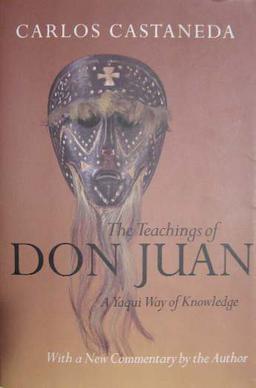Just some rambling about nothing in particular...
The idea that Jesus or the Buddha were fictitious characters is often seen as absurd or impossible, since surely all religions must have a founder and it would be obviously absurd to have a fictitious (human) founder. And besides, wouldn't people *notice* such an absence?
Well, let's see...
The strange new religion of Tensegrity has a founder. His name? Carlos Castaneda. Nobody doubts that this best-selling author was a real person. But Castaneda himself didn't claim to be the founder of Tensegrity. He supposedly got his knowledge from a Mexican shaman named Don Juan. Interestingly, Don Juan wasn't an angel or other kind of otherworldly entity. He was a flesh-and-blood human whom Castaneda encountered at a bus stop in Tucson, Arizona! He even has a biography.
There is just one problem. Don Juan isn't real. Castaneda made him up, to give his new teachings a more ancient lineage (Don Juan was supposedly initiated into an old religious tradition which, for all we know, isn't real either).
So while Castaneda is the *real* founder of Tensegrity, Don Juan is its *mythological* founder.
But wouldn't anyone notice? Well, some people did. Except for the 20 million people who bought Castaneda's books, dubbed "non-fiction" by the publishers...
But surely *today* it's different, in the Age of the Internet? Can anyone today start a movement with a fictitious founder?
It turns out that it's perfectly possible. Indeed, it happened right under our poking noses.
Yes, I'm thinking of QAnon.
Who is the "founder" of QAnon? A mysterious person named Q. But Q is (of course) fictitious. While the human or humans behind the keyboard are real persons, the character they are LARP-ing is pure fiction. And while many people are skeptical of QAnon, it can hardly be denied that the movement has been highly succesful. Just last week, some of their supporters stormed into the Capitol!
If it's possible today, why should it be impossible 2,000 years ago? Or 2,500 years ago?
And there's more. How long does it take for a real historical person to be mythologized? I suppose it might take one or two generations to *fully* mythologize somebody or something. But the initial phase can happen very quickly. Just look at how George Floyd was turned into a saint by the BLM last summer. It took a couple of days. People are even getting baptized at the spot were Floyd died. Regardless of your take on the death of Floyd, it's a fact that the man was a common crook, nothing more. Yet, he was almost overnight turned into a secular and even religious saint by the protesters.
Now, imagine somebody with more charisma, a more powerful messaging and/or more fanatical followers. Mythologization would follow pronto. Someone like Elvis Presley, maybe. Or Donald Trump...
There is also the annoying argument about "manuscript distance", popular among evangelical apologists. The idea is that the Gospels simply must be true because they were written relatively early. But this doesn't work as an argument either. Take Sai Baba. He was supposedly born of a virgin, a claim he made himself during his lifetime. Indeed, his mother was sometimes present at his mass meetings. What if a brave disciple would have rushed forward to "double-check" the claim of Sai Baba's miraculous birth? Presumably the mother of god would have confirmed it! Here, the manuscript distance is *zero*, yet no evangelical apologist would accept it at face value...
Does this prove that Jesus or the Buddha were fiction? Of course not. However, it does show that you can't disprove mythicism by an appeal to the modern religious or political milieux.

No comments:
Post a Comment